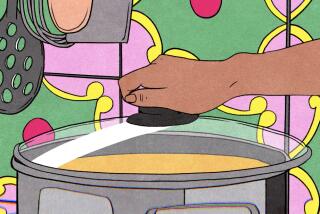‘Other Flowers: Uncollected Poems’ by James Schuyler
Other Flowers
Uncollected Poems
James Schuyler,
edited by James Metzee
and Simon Pettet
Farrar, Straus & Giroux: 218 pp., $26
The Velvet Underground, it has been said, did not sell many records, but everyone who bought one went out and started his or her own band. James Schuyler was, perhaps, the Velvet Underground of verse: Almost unknown outside the poetry world, he was massively influential within it. To read Schuyler is, almost inevitably, to be struck with the desire to be a poet.
FOR THE RECORD:
‘Other Flowers’: A March 14 review of the book “Other Flowers: Uncollected Poems” by James Schuyler misspelled co-editor James Meetze’s last name as Metzee. —
Schuyler’s powerful and frequently moving descriptions of nature, of the weather, of domestic engagements -- limpid descriptions that lay upon the sensory world like a pellucid dew -- have often seemed to constitute the heart of his poetic accomplishment.
“Mediocrity in painting is often merely an ability to leave things as they are,” he once wrote in a review of Jane Freilicher’s artwork, and he adhered to a similar view with respect to poetry. There is something almost religious about his devotion to the things of this world, perceived and appreciated in all of their directness and simplicity:
Between lilac storm clouds
we briefly see the dandelion sun
and the clouds sway shut
as lilacs heavy with rain curve
over the drive, each weighing drop
as it falls a sublime moment.
At his most memorable, Schuyler combines this sort of careful, attentive perception with the unpredictable but not random musings of a charmingly playful mind. His best books -- “Hymn to Life” and the Pulitzer Prize-winning “The Morning of the Poem” -- are profoundly, sometimes astonishingly intimate, not in the way of the confessional poets (Schuyler almost wholly eschewed their brand of theatrical self-dramatization) but in their commitment to openness, to the artful yet non-artificial depiction of one man’s roving consciousness.
Such a skill is best showcased by his longer poems, and if the new collection, “Other Flowers: Uncollected Poems,” feels somewhat slight, it is partly because the recently discovered works gathered here are all short lyrics.
This is not to say that Schuyler wrote no great short lyrics; he did -- “Korean Mums” from “The Morning of the Poem” is a particularly fine example, although far from the only one. But the lyrics in “Other Flowers” do not rise to the level of “Korean Mums.”
This is, perhaps, to be expected: There’s a reason, after all, that these poems were left uncollected, and it is not surprising that the book is, essentially, a grab-bag of leftovers.
Still, if none of the leftovers here will make a satisfying meal, some are nevertheless quite delicious. “Tears, Oily Tears . . .” begins with the line “Crying is a habit with me” before proceeding through a list of items that make the poet cry (including “headlines in the Daily News” and “Fear of getting bawled out by people shorter than me”), before ending with an image both lovely and humorous:
and, oh yes,
superfluous lines of verse and great beauty
move me to tears,
sliding out of me like oil
out of an over-oiled electric fan
“The Night,” “To Awaken” and “Poem (The Day Gets Slowly Started)” are modest, gently touching portraits of daily life -- the sort of poem that Schuyler did so well. And there are, as always, several poems mentioning Schuyler’s friends:
John Ashbery is understood to have passed
in a way of his own, en route to one
of the emblematic neckery shops he favors.
He is said to have been about to
exchange a flowery crepe for a chaster ice-
blue satin number . . .
Frank O’Hara also gets name-checked, as does Kenneth Koch, to whom two poems are addressed, including the quite funny “To Kenneth Koch,” which begins:
“Drinking a morning cup of coffee is one of the pleasures of peace,”
I thought as I drank my morning cup of coffee while reading ‘The Pleasures of
Peace.’
“It is also one of the pleasures of war,” hinted a still small voice . . .
The wit and buoyancy of such a poem makes up for a lot -- and there are, unfortunately, rather a lot -- of sterile experiments with random word assortments, or unfinished sketches whose potential was never realized.
Fans of Schuyler’s work -- and I will be the first to say that everyone who feels even a bit of affection for poetry should be a fan of Schuyler’s work -- will take great pleasure in the few poems that do feel fully formed and will find some interesting curiosities and the occasional wonderful line among the rest.
It is impossible not to wish, though, that these newly available poems had turned out to be a bit more of a treasure trove. And it is impossible not to think of Schuyler’s poem “A Few Days” (not mentioned, disappointingly, by either of the editors) in which he wrote:
I’ve got to find that notebook and tear it up, when I’m dead some creep will publish it in a thin
volume called Uncollected Verse. It will be a collector’s item. I hate to think
of the contents of that volume.
Jollimore is the author of “Tom Thomson in Purgatory,” which won the National Book Critics Circle award for poetry for 2006.
More to Read
Sign up for our Book Club newsletter
Get the latest news, events and more from the Los Angeles Times Book Club, and help us get L.A. reading and talking.
You may occasionally receive promotional content from the Los Angeles Times.








